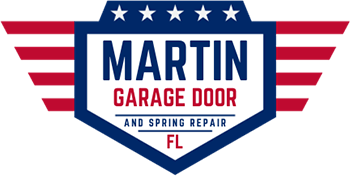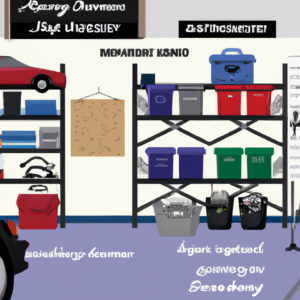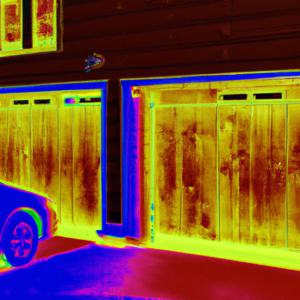Are you hesitant about buying a new garage door because of the potential cost? Don’t worry, we’ve got you covered. In this article, we’ll address all your concerns and help you make an informed decision. From budget considerations and material options to design preferences and insulation requirements, we’ll provide you with the essential questions to consider before purchasing a new garage door. So, let’s dive in and find the perfect garage door that fits your needs and budget.
Budget Considerations
Before you start shopping for a new garage door, it’s important to consider your budget and determine how much you’re willing to spend. Setting a budget will help you narrow down your options and avoid overspending. Garage doors come in a wide range of prices, depending on factors such as size, material, style, and additional features. On average, the cost of a new garage door can range from $500 to $1,500 for a basic, single-door model. However, if you’re looking for a more high-end option or a custom-made door, the price can go up to $4,000 or more. Keep in mind that the cost of installation and any necessary repairs or maintenance should also be factored into your budget. By knowing your budget beforehand, you can make an informed decision and find a garage door that fits your needs and financial capabilities.
Material Options
Consider the durability and aesthetic appeal of different material options when choosing a new garage door. The material you choose will not only affect the overall look of your home but also impact the longevity and maintenance requirements of your garage door. Steel is a popular choice for its strength and low maintenance, while wood offers a classic and natural look. Aluminum is lightweight and rust-resistant, making it a practical option for coastal areas. Fiberglass doors are durable and can mimic the appearance of wood without the maintenance. Vinyl is another low-maintenance option that is resistant to dents and scratches. Ultimately, the material you choose should align with your personal preferences, budget, and the climate in your area.
Design and Style Preferences
When choosing a new garage door, think about your design and style preferences to create the perfect look for your home. The design and style of your garage door can greatly impact the overall aesthetic of your house. Consider the architectural style of your home and choose a garage door that complements it. Whether you prefer a traditional, modern, or rustic look, there are various design options available. You can also personalize your garage door with decorative hardware, windows, and different paint finishes. Take into account the color scheme of your home and select a garage door color that harmonizes with it. Remember, your garage door is an important part of your home’s exterior, so make sure it reflects your personal style and enhances the overall curb appeal.
| Design and Style Options | Description | Pros | Cons |
|---|---|---|---|
| Traditional | Classic and timeless design | Fits well with most architectural styles | May lack uniqueness |
| Modern | Sleek and minimalist design | Adds a contemporary touch | May not suit traditional homes |
| Rustic | Warm and inviting design | Provides a cozy, country feel | May not complement modern homes |
Insulation Requirements
When considering insulation requirements for your new garage door, it’s important to think about energy efficiency options. Insulated garage doors can help regulate the temperature inside your garage, reducing heat loss in the winter and heat gain in the summer. While they may cost more initially, the potential savings on energy bills could make them a worthwhile investment in the long run.
Energy Efficiency Options
To maximize energy efficiency, assess the insulation requirements for your new garage door. Proper insulation can help regulate temperature and reduce energy loss, saving you money on heating and cooling costs. When considering energy efficiency options, look for garage doors with insulation ratings, such as R-values, that meet your climate needs. Higher R-values indicate better insulation performance. Additionally, consider the type of insulation material used. Common options include polystyrene and polyurethane. Polystyrene is more affordable, but polyurethane provides better insulation. Another energy-saving feature to consider is weatherstripping. This helps seal gaps around the door, preventing air leakage. By investing in an energy-efficient garage door, you can enhance the comfort of your garage space and improve the overall energy efficiency of your home.
Cost Vs. Savings
Assessing the insulation requirements for your new garage door will allow you to determine the cost versus savings of your purchase. Insulated garage doors offer benefits such as improved energy efficiency, reduced noise, and increased durability. While they may have a higher upfront cost compared to non-insulated doors, the long-term savings can outweigh the initial investment. By keeping the garage temperature regulated, insulated doors can help lower heating and cooling costs. Additionally, they can prevent air leakage and reduce the need for constant temperature adjustments. To help you understand the potential savings, here is a comparison of the average cost and estimated annual savings for different types of garage door insulation:
| Insulation Type | Average Cost | Estimated Annual Savings |
|---|---|---|
| Polystyrene | $200-$500 | $100-$300 |
| Polyurethane | $400-$800 | $200-$500 |
| Reflective | $100-$300 | $50-$150 |
Consider your climate, energy usage, and budget when choosing the insulation type for your new garage door.
Maintenance and Durability Factors
When considering the maintenance and durability of a new garage door, there are several important factors to keep in mind. First, you should consider the longevity of the materials used in the door’s construction. This will affect how often you may need to repair or replace certain parts, which can add to the overall cost of ownership. Additionally, regular maintenance requirements should be taken into account, as neglecting these tasks can lead to premature wear and damage.
Longevity of Materials
Consider the lifespan of different garage door materials to determine the best option for your needs. When it comes to the longevity of materials used for garage doors, there are a few factors to consider: maintenance and durability. Some materials, like wood, require more maintenance to keep them in good condition. Regular painting and sealing are necessary to prevent rotting and warping. However, with proper care, wood doors can last for many years. On the other hand, steel doors are known for their durability and low maintenance requirements. They are resistant to dents and can withstand harsh weather conditions. Another option is aluminum, which is lightweight and resistant to rust. It is important to choose a material that suits your preferences and budget, while also considering the maintenance and durability factors.
Repair and Replacement Costs
To determine the potential repair and replacement costs associated with different garage door materials, you should factor in their maintenance requirements and durability over time. Some materials, like steel and aluminum, are known for their low maintenance needs and long-lasting durability. These materials are less likely to require frequent repairs or replacements, saving you money in the long run. On the other hand, materials like wood may require more regular maintenance, such as painting or staining, to maintain their appearance and prevent damage from moisture or insects. In addition, wood doors may be more susceptible to wear and tear over time, which could lead to higher repair or replacement costs. Considering the maintenance and durability factors of different materials will help you make an informed decision and potentially save you money on future repair or replacement expenses.
Regular Maintenance Requirements
Maintaining your garage door regularly is crucial for its longevity and durability. By performing routine maintenance, you can prevent costly repairs and extend the lifespan of your garage door. Start by inspecting the door’s hardware, such as hinges, rollers, and springs, for any signs of wear or damage. Lubricating these components regularly can reduce friction and keep them functioning smoothly. Additionally, check the weatherstripping and seals around the door to ensure they are intact and properly sealing your garage from the elements. Clean the door regularly to remove dirt and debris that could potentially cause damage. Finally, test the balance and alignment of the door periodically to ensure it operates correctly. Following these maintenance tasks will help keep your garage door in optimal condition and increase its durability.
Professional Installation or DIY
Before deciding on whether to hire a professional or tackle the installation yourself, it is crucial to weigh the costs and benefits. Here are some factors to consider:
- Skill level: Do you have the necessary skills and experience to install a garage door properly?
- Time commitment: Installing a garage door can be time-consuming, especially if you are not familiar with the process.
- Safety concerns: Garage doors are heavy and can be dangerous if not installed correctly.
- Warranty: Some manufacturers require professional installation for the warranty to be valid.
- Cost savings: While hiring a professional may seem expensive upfront, it can save you money in the long run by avoiding costly mistakes.
Warranty and After-Sales Support
Consider the warranty and after-sales support when purchasing a new garage door, as they are crucial aspects to address. When investing in a garage door, it’s essential to understand the warranty terms and conditions. A comprehensive warranty can provide you with peace of mind in case of any defects or issues with your door. Look for a warranty that covers not only the door itself but also the components and installation. Additionally, after-sales support is equally important. Ensure that the manufacturer or supplier offers reliable customer service and assistance, especially if you encounter any problems or need maintenance. Having access to prompt and efficient after-sales support can save you time, money, and frustration. So, always consider the warranty and after-sales support when choosing a new garage door to ensure a satisfying and hassle-free experience.




